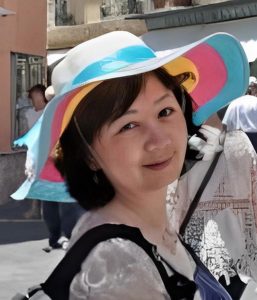 Today’s podcast episode is a Book Award Winner episode, where we get to know a writer who won the NAIWE Book Award.
Today’s podcast episode is a Book Award Winner episode, where we get to know a writer who won the NAIWE Book Award.
Tong Ge won the 2024 Book Award for her book The House Filler in the Literary Fiction category.
Born and raised in China, Tong Ge moved to Canada in the late 1980s as an international student, earning a master of science degree from the University of Saskatchewan in 1992. Since 2012, she has written under both her real name and the pen name Tong Ge, publishing poetry, prose, and short stories in English and Chinese across North America, England and Taiwan. A recipient of five literary awards and a finalist for five others. Her debut novel, The House Filler, was published in Canada in 2023. It is a finalist for the 2023 Eyelands Book Awards and the 2024 Canadian Book Club Awards for fiction and won two book awards.
Here is a preview of today’s discussion:
Your book The House Filler was recently published. Can you tell us a little bit about it?
The House Filler is told through the experiences of Golden Phoenix, a widow with bound feet who faces war, poverty and political turmoil as she fights for survival, freedom and happiness.
After the untimely death of her husband, Golden Phoenix is determined to keep her family together, although finding a close enemy intent on destroying them. However, poverty forces her to make the heart-wrenching decision to allow her teenage twins to go to the Red Army. During the upheaval of the Japanese invasion of her hometown, she is separated from her two young girls, and her remaining son leaves to fight with the Nationalist army.
Golden Phoenix, along with her adopted son, remains to endure the horrors and the hardships of war. When the Civil War ends with the Communists winning power in 1949, one of her twins, a member of the Communist Party, is wrongly accused of being a traitor and is sentenced to death. Golden Phoenix and her family must find a way to save her son’s life.
What inspired you to write this book?
I always wanted to write my family’s stories into a book but struggled to find the right angle. Then, one day in 2004, while gardening, an idea struck me — the narrator could write a series of letters to her sister in China, recalling their family history. Though this format was later replaced by each book’s protagonist telling the story from her own perspective, that moment of inspiration allowed me to begin.
My family’s story became the foundation for this book and the two that follow.
What did you learn while working on this book?
I learned many things while working on this book.
First, I proved to myself that I can write fiction in a second language—and that I am the best person to tell this story. When I first started in 2004, I wrote in Chinese but soon realized I wouldn’t have access to critique groups, beta readers, manuscript evaluators, freelance editors, or publishers. At the time, I didn’t believe I could write it in English, so I searched for a ghostwriter. When that didn’t work out, I realized I had to do it myself. I took writing courses, read books on craft, and studied as much fiction as I could to learn from other writers.
Second, I learned to be patient. Writing is a long journey. Early on, I sent out query letters too soon, not realizing that you only get one chance per agent or publisher. Submitting flawed work means losing that chance forever.
Third, I learned the importance of professional help. I don’t believe a first-time writer can do this alone.
Fourth, I learned to be humble and take feedback seriously. As emerging writers, it’s easy to get defensive when receiving criticism and to believe that if others don’t recognize our talent, it’s their problem. But there is always room for improvement. If you can’t find an agent or publisher, the issue might not be them — it might be you.

Leave a Reply